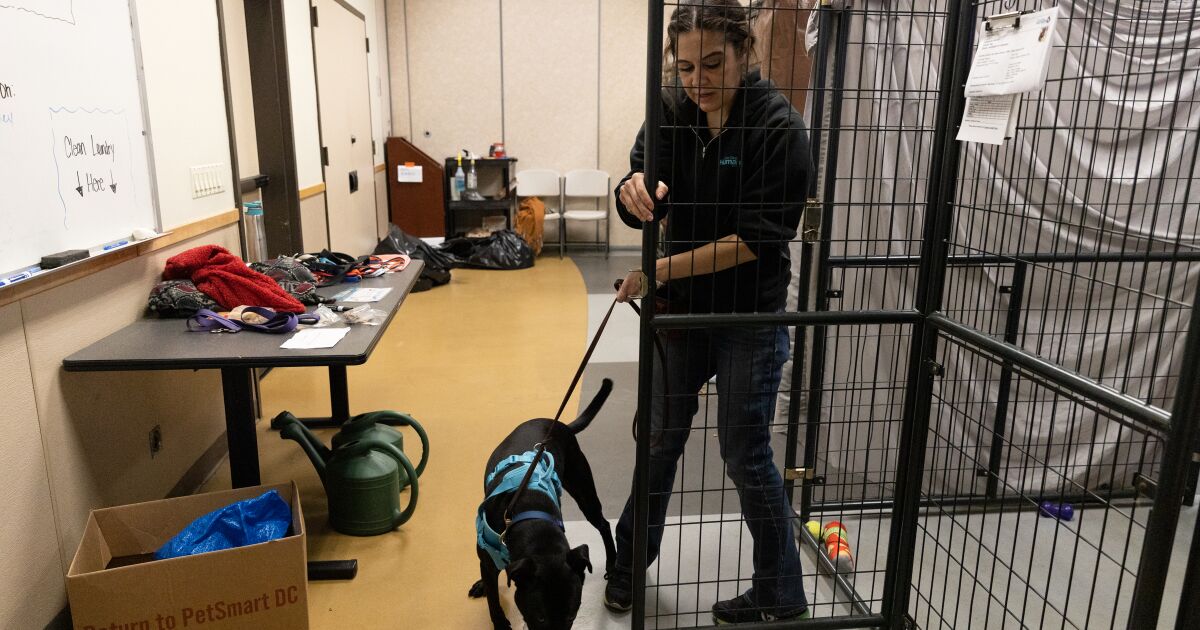- January 2, 2023
- No Comment
- 6 minutes read
San Diego Humane Society faces overcrowding at dog shelters – The San Diego Union-Tribune

Faced with full shelters, less kennel space due to renovations, and a canine distemper outbreak, the San Diego Humane Society has temporarily stopped taking in dogs surrendered by their owners.
The pause, which will run through mid-January, comes as the organization tries to deal with a perfect storm of factors that left it with more than 600 dogs at one point in December, a record high.
Although the number of dogs adopted by families increased by nearly 30 percent compared to a year ago, officials say the sheer number of stray and owner-relinquished dogs coming into the organization’s shelters in San Diego, El Cajon, Escondido and Oceanside far outpaces those going to adoptive homes.
“We are taking in two dogs for every dog that is adopted out,” said Nina Thompson, a spokesperson for the organization. As of Dec. 26, 14,173 dogs were taken in this year compared to 7,378 adopted out.
Adding to the problem, fewer strays are being reclaimed by their owners and dogs are staying longer at the shelters before being adopted.
As of Monday, there were 568 dogs being cared for by the organization, with 474 in its shelters — which were at 135 percent capacity — and 94 in foster homes.
Adding to the space crunch is a $13.7 million renovation at its San Diego facility, which has temporarily eliminated kennel space for more than 50 dogs.
The makeover at the Gaines Street site started in May. When finished this summer, all the dog rooms will have windows so adopters can view the animals, and the kennels will be angled so dogs won’t have a direct view of each other. The rooms also will feature lighting and acoustics designed to lower dog stress levels, and the floors will have drains, making the rooms easier to clean. There will be two more dog rooms, bringing the total to 58.
There also will be renovated spaces for cats and rabbits as well as guinea pigs, rats and hamsters.
With kennels in short supply, officials have relied on foster families and found some unusual fixes, such as transforming a classroom into temporary shelter space. A recently acquired warehouse up the street also is being used to house animals. Some dogs are doubled up in kennels.
“We are being very creative with dog space — and we do not euthanize for time or space,” Thompson said. “It is part of our promise to stay at zero euthanasia of healthy and treatable shelter animals.”
Hoping to encourage more adoptions, the Humane Society has put on back-to-back promotions since June, some of which reduce or waive adoption fees. In November, the organization bused more than three dozen adoptable dogs to Portland. “We reached out to Oregon Humane Society for help when we exceeded capacity in November and they graciously offered to help by taking in 41 dogs,” Thompson said.
In December, a donor gave the organization $10,000 to be used to waive adoption fees for adult dogs through the end of the year. Fees typically run $100 for dogs 7 months to 7 years old, and $30 for seniors over 7. Since the campaign began Dec. 13, more than 200 adult dogs have been adopted, including 23 seniors.
Thompson said the promotion resulted in nearly $18,600 in adoption-fee waivers as of Dec. 28.
Another challenge hit the Humane Society in December when canine distemper cases were found in the shelters. So far, nine dogs have tested positive for the virus. That prompted the organization to temporarily halt accepting surrendered pets — which they also did earlier in the year when officials found cases of canine pneumovirus, another infectious respiratory disease.
According to the American Veterinary Medical Association, canine distemper is a contagious and sometimes fatal disease caused by a virus that attacks the respiratory, gastrointestinal and nervous systems. It is spread when puppies or dogs cough or sneeze or from sharing water or food bowls.
Thompson said many shelters have a surplus of adoptable dogs. The economic downturn may have prompted some to give up the expense of caring for a pet, she said. There’s also a feeling that the market may be saturated, she said, with those who were looking to adopt already having a dog at home.
“Currently, everyone is struggling. Everyone is full,” she said. “Everyone is experiencing the same thing.”
The two shelters operated by the county Department of Animal Services also are dealing with “an unusually high inventory” of dogs, DAS Director Kelly Campbell said through a spokesperson. She said there were more than 100 dogs at each of the Carlsbad and Bonita locations — about twice what is typical for this time of year.
With dogs staying in the shelters longer, Campbell said, “adopters and fosters are urgently needed.”
While the Humane Society will make exceptions and accept owner-surrendered dogs in emergencies or when a dog’s health is at stake, Thompson said the organization urges owners to hold on to unwanted pets until Jan. 15 and to try to find new homes for the animals. The organization offers resources to help such as assistance with veterinary care and free food.
People also should try to reunite strays with their owners rather than bring them to overcrowded shelters. “So many times (lost pets) are a few blocks from their home,” Thompson said.
Top headlines by email, weekday mornings
Get top headlines from the Union-Tribune in your inbox weekday mornings, including top news, local, sports, business, entertainment and opinion.
You may occasionally receive promotional content from the San Diego Union-Tribune.
Follow Us
Privacy Policy
Terms of Service
Sign Up For Our Newsletters
Follow Us

